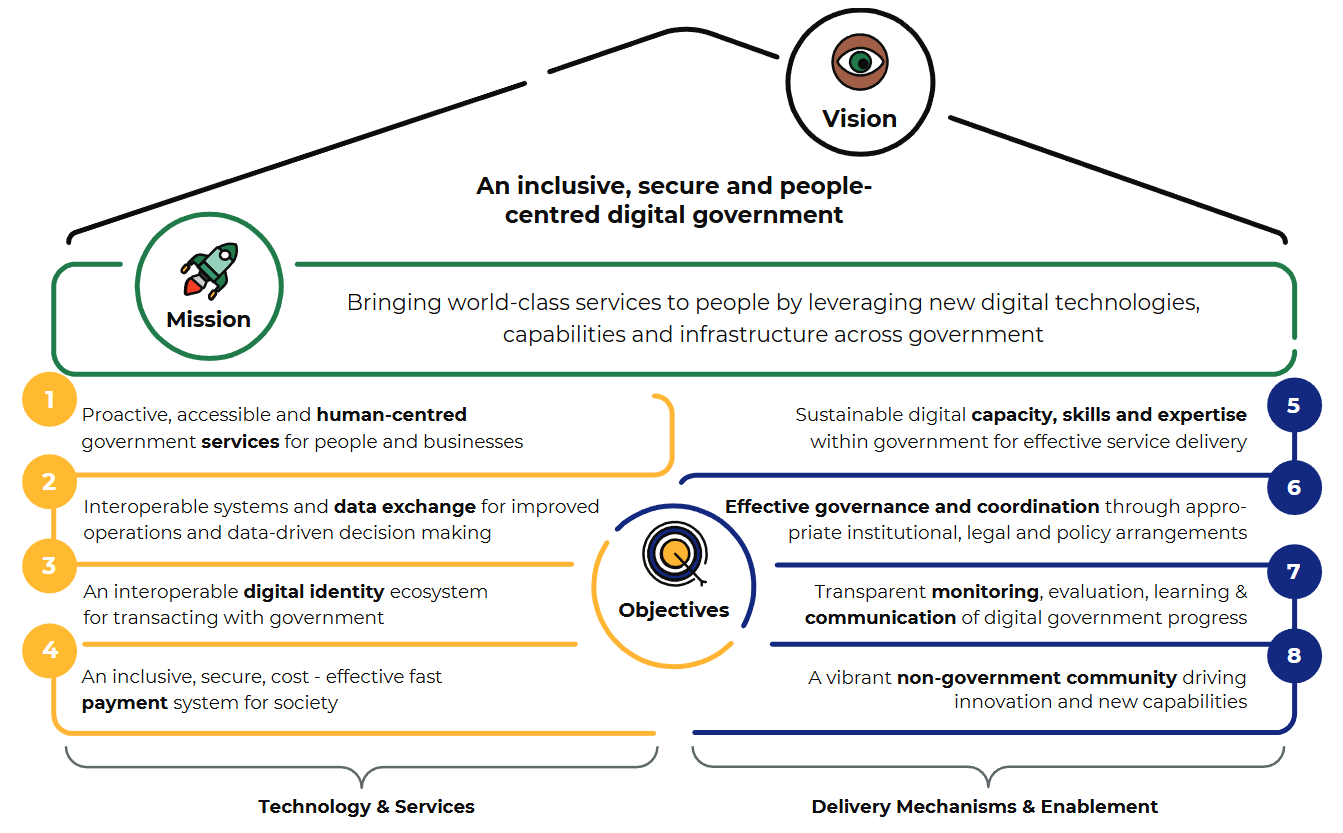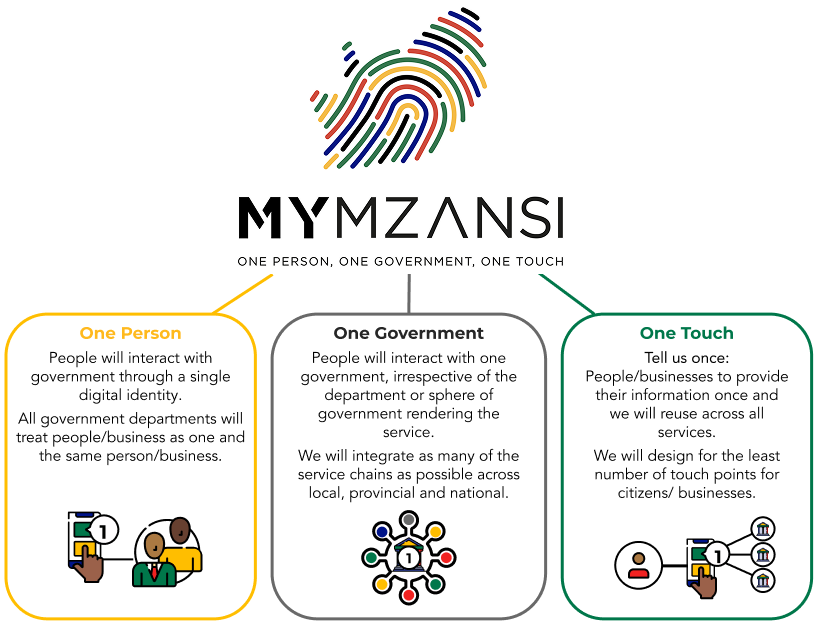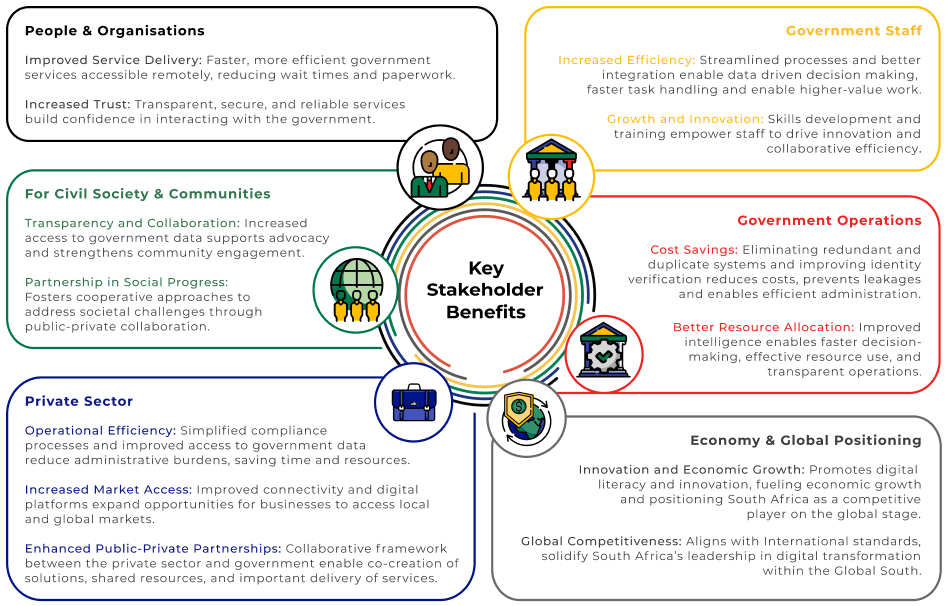The Future of Government Services
This roadmap aspires to deliver a safe and inclusive future by changing how government services are designed and accessed.
Focus group discussions were conducted with key groups across the country — many of whom are vulnerable. This roadmap aims to address the challenges faced by these groups of people by overcoming barriers to accessing services and ensuring the development of quality services.
This roadmap upholds the Batho Pele principles and is positioned to support South Africa in achieving the Sustainable Development Goals over the long term. It is also intentional and directive: it contributes to efforts to overcome poverty, inequality and unemployment. It has been designed to work within fiscal constraints and to save on unnecessary and duplicative costs.
The majority of people, particularly those in rural areas with access to predominantly non-digital channels or limited access to technology, will remain a priority. Inclusive transformation does not mean removing non-digital channels for service access; rather, it eliminates barriers to access. An inclusive digital government leaves no one behind in the transformation.
Vision, Mission, Objectives

The vision of a people-centred digital government is about achieving practical improvements in the lives of the people in South Africa.
Current service provision challenges can be minimised and resolved through integrated and smart technology.
At present, hard copies of documents must be submitted repeatedly for service enrolment across departments and there are long queues on multiple visits to different offices, which demand time off work and money for transport. There are often delays and errors that frustrate applicants, while inaccurate information about where to access services creates barriers and breaks trust.
Bringing the Vision to Life: Thandi’s Journey
Thandi, a young South African woman, offers a glimpse into the future we are creating. A future where government services are in the palm of her hand through the MyMzansi platform, and information on services, and where to access them, is always accurate and available.
A Digital ID enables access to the platform’s benefits: targeted educational programmes, personalised job opportunities, easy-to-book healthcare appointments, social assistance and low-cost payments.

How MyMzansi could support Thandi across major life events:
Education and Training
After 12 years of hard work, the moment has arrived for Thandi to receive her matric results. Unlike in the past, when Thandi would have had to visit her school to get her certificate; by 2030 MyMzansi will give her free access in one touch to an authenticated copy of her Grade 12 qualification. Thandi can share electronic versions of her certificate, and other important documents, safely and securely.
Employment and Entrepreneurship
At this stage, Thandi, and others in the Class of 2030, completed varsity. As she explores her options, MyMzansi uses artificial intelligence (AI) to send Thandi job openings based on her profile. She can access work-seeker support, such as job-seeker grants, training programmes and bursary schemes, making it easier for her to build a career. Thandi saves the ZAR 1,500 per month she would have spent searching for a job in the past.
Healthcare and Social Services
When Thandi becomes a mother, she uses MyMzansi to organise her child’s healthcare needs. She gets reminders for vaccinations and suggestions on the closest facilities that provide services. As Thandi juggles the demands of being a parent, she need not worry about how her mother will register for a SASSA old-age grant. Thandi’s mother can either apply for the old-age grant on her own, following simple prompts on MyMzansi; or get her daughter to assist in the comfort of their home at no cost.
MyMzansi: Key Stakeholder Benefits
Effective digital transformation of government will affect society by creating new ways for people, organisations and government to interact.

